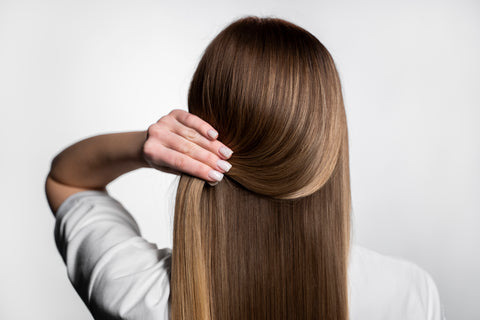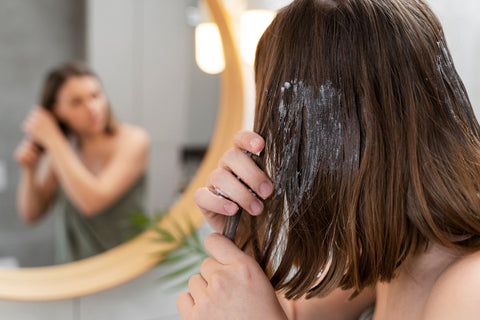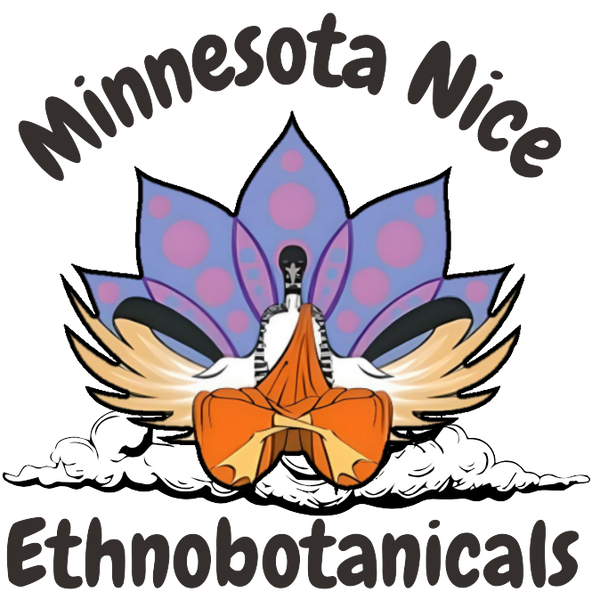
What Are The Benefits Of Blue Lotus For Hair?
Share
Blue lotus, also known as the Egyptian lotus or Nymphaea caerulea, is a beautiful aquatic flower with a long history of cultural and medicinal significance. Recently, it has gained popularity in the beauty industry for its potential benefits for hair health. This outline explores the various purported benefits of blue lotus for hair, the scientific evidence supporting these claims, and potential drawbacks and considerations for use.

Potential Benefits of Blue Lotus for Hair
Strengthening and Repairing Hair
-
Potential for increased hair protein (keratin) synthesis: Blue lotus is rich in certain nutrients, including amino acids, which are the building blocks of proteins like keratin. Keratin is the primary protein in hair and plays a crucial role in its strength and structure. While research directly linking blue lotus to increased keratin synthesis in hair is limited, some studies suggest that specific amino acids found in the flower may contribute to overall protein synthesis in the body. This, in theory, could indirectly support keratin production and contribute to stronger hair.
-
Improved hair elasticity and tensile strength: Healthy hair possesses good elasticity, allowing it to stretch and return to its original shape without breaking. Tensile strength refers to the hair's ability to resist breakage under tension. Blue lotus is believed to contain certain compounds, like flavonoids, with potential antioxidant and anti-inflammatory properties. These properties might help protect hair from damage caused by free radicals and environmental stressors, potentially improving its elasticity and tensile strength. However, further research is needed to confirm this specific benefit for hair.
-
Anecdotal evidence for reduced hair breakage and split ends: While scientific evidence is lacking, many users of blue lotus products report experiencing less hair breakage and split ends. This could be attributed to the potential benefits mentioned above, such as increased hair strength and improved elasticity. Additionally, some blue lotus hair products include additional moisturizing and conditioning ingredients that may further contribute to improved hair manageability and reduced breakage.
Promoting Hair Growth
-
Possible stimulation of scalp circulation: Scalp circulation plays a vital role in delivering essential nutrients and oxygen to hair follicles, which are responsible for hair growth. Some studies suggest that blue lotus may possess vasodilatory properties, meaning it could potentially help dilate blood vessels and improve blood flow. This improved circulation, if present, could theoretically create a more favorable environment for hair growth by ensuring proper delivery of nutrients to the follicles. However, more research is needed to definitively confirm this effect specifically in the context of hair growth and scalp circulation.
-
Anti-inflammatory properties for a healthy scalp environment: Inflammation in the scalp can disrupt the hair growth cycle and contribute to hair loss. Blue lotus is known for its potential anti-inflammatory properties, which may help create a healthier scalp environment by reducing irritation and calming inflammation. This, in theory, could indirectly support healthy hair growth by removing a potential barrier to optimal follicle function. However, it is crucial to note that blue lotus should not be considered a substitute for consulting a dermatologist for any persistent scalp conditions.
-
Limited research on direct hair growth promotion: While some theories suggest potential mechanisms for how blue lotus might indirectly support hair growth, there is currently limited scientific research directly investigating its ability to promote hair growth. More clinical studies are needed to definitively assess its effectiveness in this area.
Enhancing Hair Shine and Manageability
-
Emollient properties for added moisture and shine: Blue lotus is believed to possess emollient properties, meaning it can help soften and smooth the hair shaft. This can lead to increased shine and a more manageable appearance. Additionally, some blue lotus hair products may contain other ingredients, like oils and humectants, that further contribute to moisture retention and shine.
-
Potential for reduced frizz and improved manageability: Frizzy hair often lacks moisture and can be difficult to manage. The potential emollient properties of blue lotus, along with additional moisturizing ingredients often found in blue lotus hair products, may help smooth the hair cuticle and reduce frizz. This can lead to improved manageability, making hair easier to style and brush.
-
Anecdotal evidence for a smoother and silkier hair texture: Many users of blue lotus hair products report experiencing a smoother and silkier hair texture. This could be attributed to the potential benefits mentioned above, such as increased moisture retention and reduced frizz. It is important to remember that individual experiences may vary, and anecdotal evidence does not necessarily translate to scientific proof.
Combating Premature Hair Graying
-
Antioxidant properties for fighting free radical damage: Free radicals are unstable molecules that can damage cells and contribute to various aging processes, including hair graying. Blue lotus is rich in antioxidants, which are compounds that help neutralize free radicals and protect cells from damage. While research directly linking blue lotus to preventing hair graying is scarce, the potential antioxidant properties could theoretically play a role in protecting hair follicles from free radical damage and potentially delaying the onset of premature graying. However, it is important to note that hair graying can have various causes, including genetics and underlying health conditions. Addressing these underlying causes is crucial for managing hair graying effectively.
-
Limited research on direct impact on hair graying: Despite the potential antioxidant properties, there is currently limited scientific research directly investigating the effectiveness of blue lotus in preventing or delaying hair graying. More research is needed to determine whether blue lotus can truly impact this specific aspect of hair health.
Soothing Scalp Conditions
-
Anti-inflammatory properties for reducing scalp irritation: As mentioned earlier, blue lotus possesses potential anti-inflammatory properties. This can be beneficial for individuals experiencing scalp irritation caused by various factors like dryness, dandruff, or even certain styling products. The anti-inflammatory properties may help soothe irritation and reduce discomfort. However, it is important to remember that blue lotus is not a cure for any scalp condition. In cases of persistent or severe scalp issues, consulting a dermatologist is crucial for proper diagnosis and treatment.
-
Potential benefits for dandruff and other scalp concerns: Dandruff is a common scalp condition characterized by flaking and itching. While the exact cause of dandruff is not fully understood, some theories suggest it might be linked to inflammation. If blue lotus's potential anti-inflammatory properties can indeed help reduce scalp irritation, it could offer some relief for dandruff sufferers. However, it is crucial to note that blue lotus should not be considered a first-line treatment for dandruff and may not be effective for everyone. It is always best to consult a dermatologist for personalized advice and treatment options.
- Importance of consulting a dermatologist for persistent issues: It is important to emphasize that blue lotus, while potentially offering various benefits, should not be seen as a substitute for professional medical advice. If you are experiencing any persistent scalp conditions, such as severe dandruff, itching, or hair loss, consulting a dermatologist is crucial for proper diagnosis and treatment. A dermatologist can assess your specific condition and recommend the most appropriate course of action.

Scientific Evidence Supporting the Benefits
This section critically evaluates the scientific evidence supporting the claims made about blue lotus's benefits for hair. It will include:
Discussion of existing research on blue lotus's properties and their potential effects on hair health:
-
Blue lotus and hair protein synthesis: While research directly linking blue lotus to increased keratin synthesis in hair is limited, some studies suggest that specific amino acids found in the flower, such as lysine and methionine, may contribute to overall protein synthesis in the body. This, in theory, could indirectly support keratin production and contribute to stronger hair. However, more research specifically investigating this pathway in the context of hair health is needed.
-
Blue lotus and hair elasticity/tensile strength: Studies suggest that blue lotus contains flavonoids, which possess potential antioxidant and anti-inflammatory properties. These properties might help protect hair from damage caused by free radicals and environmental stressors. In theory, this could improve hair elasticity and tensile strength. However, research specifically investigating this effect on hair is lacking, and further studies are needed to confirm this potential benefit.
-
Blue lotus and scalp circulation: Some studies suggest that blue lotus may possess vasodilatory properties, meaning it could potentially help dilate blood vessels and improve blood flow. This improved circulation, if present in the scalp, could theoretically create a more favorable environment for hair growth by ensuring proper delivery of nutrients to the follicles. However, more research specifically investigating this effect in the context of scalp circulation is needed.
-
Blue lotus and anti-inflammatory properties: Blue lotus extracts have been shown to exhibit anti-inflammatory activity in various studies. This suggests potential benefits for reducing scalp irritation and creating a healthier scalp environment. However, it is important to note that these studies were often conducted in vitro (in laboratory settings) or on animal models. Further clinical studies are needed to understand the effectiveness of blue lotus in humans and its specific impact on various scalp conditions.
- Blue lotus and hair growth: Currently, there is limited scientific research directly investigating the ability of blue lotus to promote hair growth. While some theories suggest potential mechanisms, such as improved scalp circulation and anti-inflammatory properties, these require further investigation through well-designed clinical studies.
Analysis of the limitations of current research:
-
Limited studies and sample sizes: Many studies investigating the properties of blue lotus are limited in scope and sample size. This makes it difficult to draw definitive conclusions about the effectiveness and generalizability of the findings to the broader population.
-
Lack of high-quality clinical trials: Most existing research on blue lotus relies on in vitro studies or animal models. While these studies can provide valuable insights, they do not necessarily translate directly to human subjects. High-quality clinical trials with larger, diverse participant pools are needed to establish robust evidence for the effectiveness of blue lotus for hair health.
-
Focus on isolated properties, not on whole product effects: Many studies focus on the isolated properties of blue lotus extracts, not on the actual products containing the ingredient. This can be misleading, as the final product may contain other ingredients that interact with blue lotus and potentially influence its overall effects on hair.
Differentiation between established scientific evidence and anecdotal claims requiring further investigation:
It is crucial to differentiate between established scientific evidence and anecdotal claims about the benefits of blue lotus for hair.
-
Established scientific evidence: This refers to findings from well-designed, controlled studies published in reputable scientific journals. These studies typically follow rigorous methodologies and provide reliable data to support claims about the effectiveness of an intervention.
-
Anecdotal claims: These are personal experiences or observations not necessarily supported by scientific evidence. While some users of blue lotus products report positive experiences, these claims lack the controlled setting and rigorous methodology required for scientific confirmation.
It is important to be aware of this distinction and to base your understanding of blue lotus's benefits for hair on established scientific evidence rather than solely on anecdotal claims.

Drawbacks and Considerations
While the potential benefits of blue lotus for hair are intriguing, it is crucial to be aware of certain drawbacks and considerations before incorporating it into your hair care routine.
Limited availability and potential for high cost of products containing blue lotus:
-
Blue lotus is not as widely available as some other hair care ingredients. This can make finding products containing blue lotus more challenging, especially depending on your location.
-
Products containing blue lotus can also be more expensive compared to other hair care options. This is likely due to the relative scarcity of the flower and the potential costs associated with extraction and formulation.
Lack of long-term safety studies on topical application of blue lotus:
-
While some studies suggest potential benefits of blue lotus extracts, most research focuses on the isolated properties rather than the long-term safety of topical application on the scalp.
-
Long-term safety studies are crucial for understanding potential side effects and interactions with other medications or skincare products. The lack of such studies for topical blue lotus application necessitates caution and further research.
Potential for allergic reactions in some individuals:
-
As with any new product, there is a potential for allergic reactions when using blue lotus for hair. Symptoms may include itching, redness, burning, or swelling of the scalp.
-
If you have sensitive skin or a history of allergies, it is essential to perform a patch test before applying any product containing blue lotus to your entire scalp. To do this, apply a small amount of the product to a non-irritating area, such as the inner arm, and wait 24-48 hours to observe any reactions.
Importance of choosing high-quality, reputable products with clear ingredient lists:
-
Given the limited availability and potential for high cost, choosing high-quality, reputable products with clear ingredient lists is crucial.
-
Look for products from established brands with a good reputation for using safe and effective ingredients.
-
Carefully review the ingredient list to ensure you understand all components of the product and identify any potential allergens or ingredients you may want to avoid.
Consulting a dermatologist or healthcare professional before using blue lotus, especially if pregnant, breastfeeding, or with pre-existing skin conditions:
-
Before incorporating blue lotus into your hair care routine, it is always best to consult with a dermatologist or healthcare professional, especially for individuals in specific situations:
-
Pregnant or breastfeeding women: As the safety of blue lotus for pregnant or breastfeeding individuals is not yet fully established, consulting a healthcare provider is crucial before use.
-
Individuals with pre-existing skin conditions: If you have any pre-existing scalp conditions, such as eczema or psoriasis, it is essential to consult a dermatologist before using blue lotus, as it might potentially worsen these conditions.
By being aware of these drawbacks and considerations and consulting a healthcare professional when necessary, you can make informed decisions about incorporating blue lotus into your hair care routine while minimizing potential risks.
Conclusion
This outline has explored the potential benefits of blue lotus for hair, ranging from strengthening hair and promoting scalp health to enhancing shine and manageability. However, it is crucial to remember that the scientific evidence supporting these claims is still evolving. While some studies suggest promising properties of blue lotus, many aspects require further investigation through high-quality clinical trials with larger and more diverse participant pools.
While the potential benefits hold promise, several drawbacks and considerations must be weighed before incorporating blue lotus into your hair care routine. These include limited availability, potential allergic reactions, and the need for more long-term safety studies.
Choosing reputable products with clear ingredient lists and consulting with a dermatologist or healthcare professional beforehand are essential steps, especially for individuals with specific health conditions or concerns.
Ultimately, the decision to use blue lotus for hair care should be based on a careful consideration of the potential benefits and drawbacks, individual needs, and consultation with a healthcare professional. As research continues to explore the effectiveness and safety of blue lotus for hair health, a more comprehensive understanding of its potential will emerge in the future.
